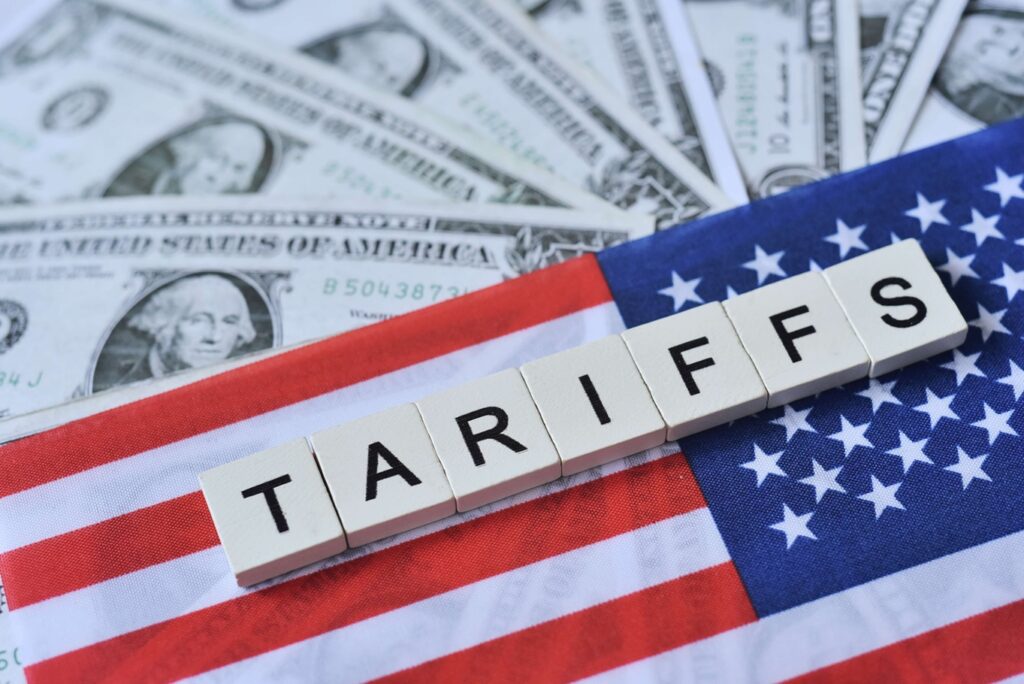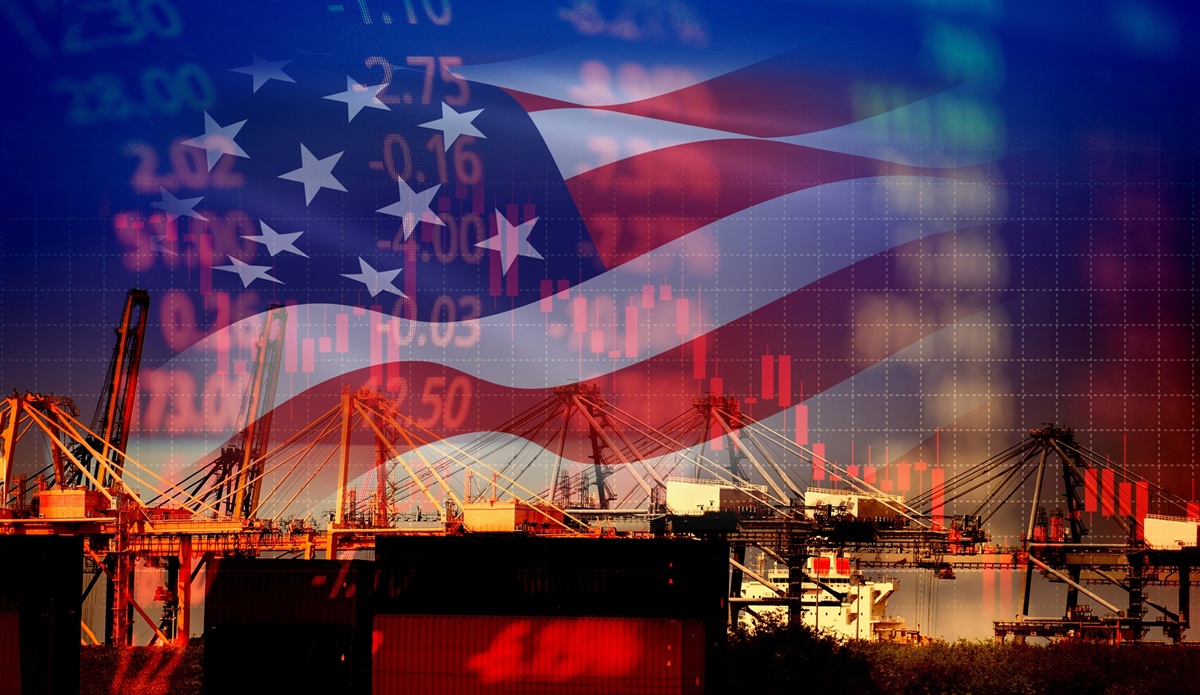Trump Tariffs Blocked: On May 28, 2025, the U.S. Court of International Trade ruled that the “Liberation Day” tariffs, introduced in April 2025, were illegally imposed. The court found that the administration exceeded its authority under the International Emergency Economic Powers Act (IEEPA) by unilaterally applying broad tariffs without Congressional approval.

What Were the ‘Liberation Day’ Tariffs?
These tariffs were part of a sweeping trade action rolled out under the banner of economic nationalism and anti-narcotics enforcement. They included:
- A universal 10% baseline duty on nearly all imported goods, regardless of origin or sector, effective April 5, 2025. U.S. Customs and Border Protection
- Reciprocal tariffs specifically targeting countries with trade surpluses with the U.S.—notably China, the EU, Canada, Mexico, and others—with rates ranging from 11% to as high as 50%. Court of International Trade
- Fentanyl-focused tariffs on imports are believed to be contributing to the U.S. opioid crisis, with primary sources identified as China, Mexico, and Canada.
These measures were introduced under the authority of IEEPA, which the court determined does not provide a legal basis for such broad, peacetime trade action.
The tariffs were instituted under IEEPA, which grants the President authority to regulate commerce after declaring a national emergency in response to an “unusual and extraordinary threat.”
However, the U.S. Court of International Trade ruled that:
- The administration overstepped its authority under IEEPA.
- The declared national emergency did not meet the statutory requirements, as trade deficits and fentanyl concerns, while significant, did not constitute an “unusual and extraordinary threat” as defined by the Act.
Consequently, the court invalidated the universal 10% tariffs, the reciprocal tariffs, and the fentanyl-related import restrictions.
It’s important to note that tariffs imposed under other statutes—such as those on steel, aluminum (Section 232), and autos—remain unaffected by this ruling.
Trump Tariffs Blocked: A Brand-Focused Q&A
Are the tariffs lifted immediately?
No. Despite the court ruling, the tariffs remain in effect. The Trump administration has appealed the decision, placing the ruling on legal hold. Until the appeal process is resolved and CBP (Customs and Border Protection) issues new guidance, importers must continue paying the existing tariffs.
There is no operational change for importers or logistics providers at this time. Businesses should remain compliant and avoid premature changes to pricing or sourcing.
Will affected importers be refunded for tariffs already paid?
Not at this time. Although the court invalidated the tariffs, refunds are not guaranteed—especially since the appeal could reverse the decision. CBP has not issued any instructions related to retroactive reimbursements.
Even if the appeal fails, the government may delay or complicate the refund process. Importers should begin tracking affected shipments and duty amounts now so they are prepared to submit claims promptly if refunds become available.
Should I change my sourcing or shipping strategy now?
Not immediately. Since tariffs are still being collected and no regulatory changes have been announced, the situation remains too uncertain for major adjustments. However, now is a good time to review your current supply chain exposure and model cost scenarios in the event the tariffs are lifted.
Use this time to identify low-margin SKUs most affected by the tariffs and explore flexible supplier options—without taking irreversible action until guidance is clear.
What does this ruling actually cover—and what does it not?
The ruling only affects the “Liberation Day” tariffs, which include the 10% blanket duty, reciprocal tariffs targeting trade surplus countries, and fentanyl-related import restrictions. It does not affect tariffs on steel, aluminum, or autos, which were implemented under different legal authorities.
If you’re importing goods already subject to Section 232 or 301 tariffs, this ruling won’t impact your costs. Review your tariff classifications to determine whether your shipments fall under the “Liberation Day” measures.
Why was the ruling issued? What’s the legal issue?
The court found that the administration exceeded its authority under IEEPA, a law designed for short-term, clearly defined emergencies—not for sweeping, long-term trade actions. By using IEEPA to impose broad tariffs without Congressional involvement, the administration violated the balance of powers set out in the Constitution.
This ruling may limit future presidents’ ability to use emergency declarations to bypass Congress on trade matters. In the long term, this could result in more predictable, debate-driven tariff policy.
Is it beneficial to switch to a U.S.-based 3PL in light of the tariff uncertainty?
In many cases, yes—especially for brands that rely on overseas fulfillment or import finished goods subject to tariff scrutiny. While not a silver bullet, moving to a U.S.-based 3PL can help mitigate certain risks and improve operational flexibility during periods of trade instability.
Shifting part of your supply chain—such as final assembly, kitting, or packaging—to a domestic provider can reduce tariff exposure, particularly when components are imported but final fulfillment is done within the U.S. Additionally, U.S.-based 3PLs tend to respond more quickly to updates from CBP and other regulatory bodies, helping brands stay compliant amid changing trade rules.
There are also downstream benefits. Proximity to the end customer often translates to faster delivery times, reduced last-mile costs, and improved customer satisfaction.
However, switching to a U.S.-based 3PL doesn’t eliminate all exposure to global supply chain risk—especially if raw materials or finished goods are still sourced internationally. It also requires thoughtful planning and onboarding. But for many brands, especially those with thin margins or time-sensitive shipping needs, it’s a strategic move worth considering.

Trump Tariffs Blocked: What Brands and Fulfillment Teams Need to Know —In Short
While the ruling is legally significant, its practical impact is not immediate. Here’s what brands and 3PL providers should remember:
- The ruling has been formally appealed. The tariffs remain in place during the appeal process.
- U.S. Customs and Border Protection (CBP) has not issued new guidance.
- No refunds for paid duties are available at this time.
- Imports remain subject to the tariffs—do not change pricing or routing strategies yet.
- Monitor your most affected SKUs and document duty amounts—this will be essential if refunds are approved.
- Communicate clearly with clients or internal teams, especially if cost decisions were based on these tariffs.
- Begin scenario planning to assess how tariff changes could impact margin, demand, or vendor strategy.
Contact Us Today
Start enjoying the benefits of Jay Group
